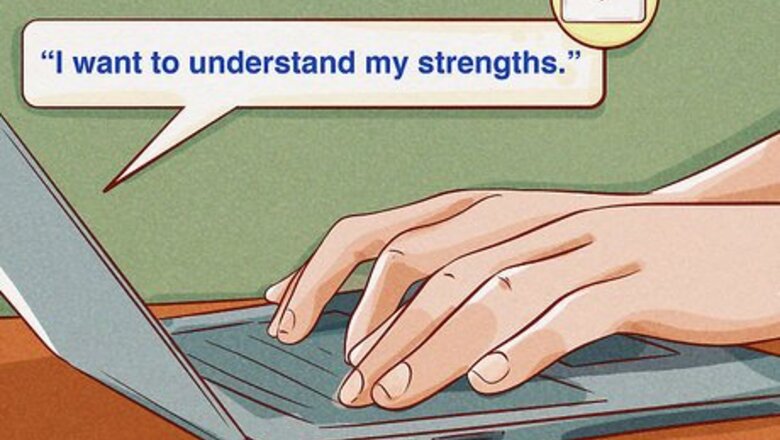
views
- Reflect on your life and think of 3-5 experiences that felt successful, identifying the skills and traits that come up over and over again.
- Take career or strength tests, and learn about the different types of intelligence so you know which ones you specialize in.
- For a job interview, figure out what strengths are needed and match those to your personal strengths, using specific instances you can talk about.
Reflecting on Your Life
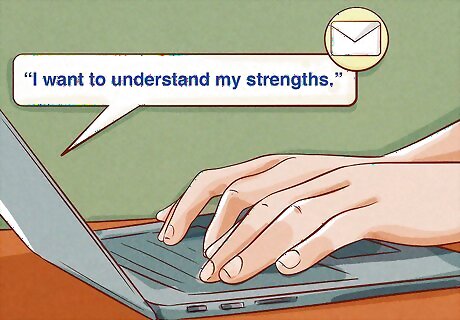
Ask people you trust to tell you what they think are your strengths. Pick at least 5 people who know you well and you trust to provide good feedback. Then, send them an email explaining that you’re trying to identify your strengths so you can choose a career or life path based on them. Include a set of questions in the email and ask that they return it within 3 days. Then, review their responses to find out which strengths come up multiple times. If someone hasn’t responded, send a reminder on the day of the deadline. You might write, “I want to understand my strengths so I can use them to be more successful. I really value your opinion, so I hope you’ll answer these questions about me. Please send your response by Friday, August 16. Also, thank you so much for your time and help.” Questions you might ask include: What do you see as my strengths? What do you think is my deepest gift? Based on these strengths, what career do you think I would best succeed at?
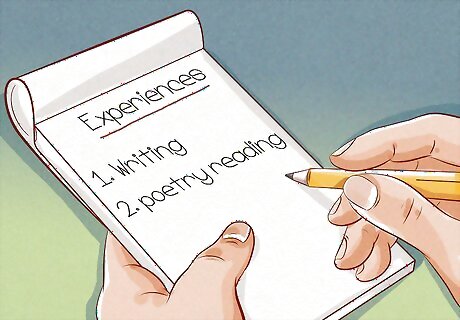
Identify 3-5 instances in your life where felt most successful. These can be either big or small experiences. Write a journal entry about each of these instances. Then, read through each entry to identify the strengths you displayed during those activities. Pay special attention to the talents, skills, and traits that pop up multiple times. These are likely your strengths. For instance, your 3 experiences might be the time you won an essay contest, the day you started an internship, and the day you participated in an invite-only poetry reading. You might notice that the overlapping skills are your talent for writing, your creativity, and your ability to connect with others.
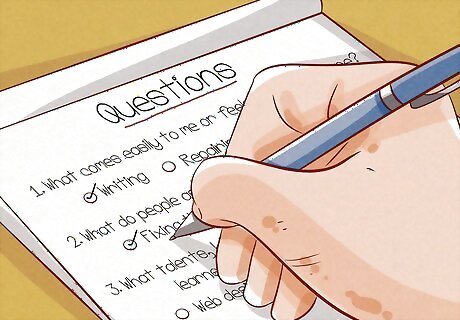
Assess your knowledge, experience, and traits to find your strengths. Start by answering the following questions that can help you identify your strengths. Then, look for common threads among your answers. Consider which talents, traits, and skills come up repeatedly. These are your personal strengths. Here are the questions to ask yourself: What comes easily to me or feels second nature? (Example: writing, repairing cars, public speaking) What role do I play in my family? (For instance, you might be the caregiver, the peacemaker, or the planner.) When do you feel like you’re “in the flow?” (For instance, you might feel in the flow when you’re cooking or programming.) What do people ask you to help them with? (Example: fixing their computer, romantic advice, help with a pet) What types of problems do you enjoy solving? (Example: You might enjoy home improvement projects or organizing someone’s workspace.) What knowledge and skills have you learned throughout your career? (For instance, you might have learned managerial skills or public speaking.) What talents, knowledge, and skills have you learned in your personal life? (Example: Web design, playing the piano, or dancing) What extra tasks have you taken on at work just because you like them? (Example: Planning office parties, designing flyers, or helping clients with their complaints) What kinds of things did you do as a child? (Example: You drew pictures, hiked in the woods, or played doctor.) What qualities do you love about yourself? (For instance, you might appreciate your creativity and perseverance.) When do you feel like you shine, either in your personal or work life? (You might feel like you shine when you’re helping others or showing off something you made.)
Assessing Your Strengths

Take career and strength tests to point you in the right direction. These are tools that can help you better understand yourself. Do several online tests and collect the results. Then, review all of your results to look for commonalities. This will help you identify your personal qualities and traits that are your strengths. VIA Character Strengths Assessment (free): http://www.viacharacter.org/www/ University of Kent Strengths test (free): https://www.prospects.ac.uk/planner Truity Myers-Briggs Type Assessment (free or $29.99): https://www.truity.com/test/type-finder-personality-test-new Clifton Strengths Assessment by Gallup (costs $49.99): https://www.gallupstrengthscenter.com/Tip: A professional therapist or life coach can give you more thorough personality and strength testing.

Recognize different types of intelligence within yourself. While you might think of intelligence as just being smart, there are actually multiple types of intelligence. Each type of intelligence is important in different ways. Here are the different types of intelligence that you can possess: Verbal-linguistic intelligence (words and writing) Logical and mathematical intelligence (abstract logic and numerical reasoning) Spatial and visual reasoning (ability to think in images and visualize accurately) Bodily-kinesthetic intelligence (ability to control your body and handle objects) Musical intelligence (ability to make music) Interpersonal intelligence (ability to understand and relate to others) Intrapersonal awareness (self awareness) Naturalist intelligence (understanding nature) Existential intelligence (understanding life’s deep questions)Tip: Incorporate the intelligences you discover within yourself into your list of strengths.

Learn common skill sets so you can recognize them in yourself. You may have strengths that you've never recognized. It's hard to know what to look for if you aren't sure what counts as a strength. Look at the following list of strengths and consider which ones you might possess: Communication skills Empathy Social and emotional intelligence Leadership skills Ability to persuade Ability to analyze Critical thinking skills Strategic thinking skills Problem solving skills Planning skills Organizational skills Technical or mechanical abilities Traits like honesty, integrity, creativity, dependability, and responsibility Artistic ability Writing skills Public speaking skills Teaching skills Project or people management skills Physical coordination Humor
Discussing Your Strengths in an Interview
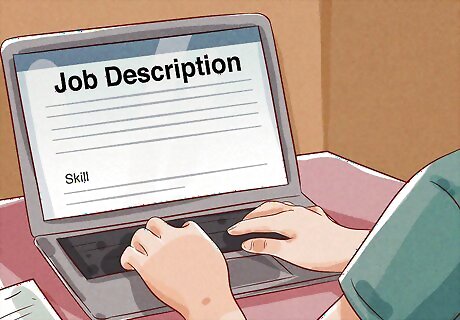
Review the job description to identify the strengths required. The job description tells you exactly what the employer wants, so make sure you show how you meet these requirements. Read over the job description several times and identify the key words. Additionally, note the knowledge and skills required for the job. Turn this into a list of desired strengths. For instance, the job description might say things like, “ability to solve problems independently, knowledge of basic editing software, and ability to prioritize tasks.” These are strengths you would need for the job.
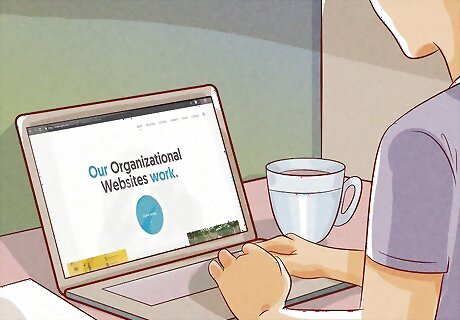
Read about the organization to learn about their culture. Start by visiting their website and reading what’s posted by the organization. Then, do a simple Internet search to find out what other people are saying about it. Finally, read the most recent news articles about the organization, if there are any. This can give you insight into what they truly value. For instance, if the company is known for taking big risks, you’ll know they value innovation even if that’s not listed in the job description. Use this information to answer the questions in your interview. It shows that you’ve taken the initiative to learn about the company.
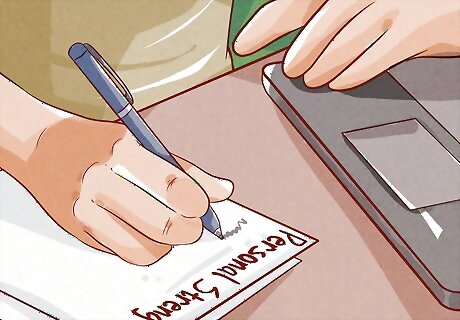
Match your personal strengths to the skills in the job description. Review the strengths you’ve identified by reflecting on your past and assessing your personality. Next, identify the strengths that best fit this job. Then, consider how your personal strengths might make up for skills in the job description that you don’t have. For instance, you might have a lot of experience with editing software that you can use if you get this job. On the other hand, you may not have worked independently in your prior jobs. However, you could use your talent for a solo hobby, like woodworking, to show that you can work well independently. You can show photos of your projects to back up your claims and make you more memorable.

Identify examples and anecdotes you can use to show your strengths. The best way to explain your strengths is to show how you’ve used them in your work, educational, or personal life. Think about the ways you’ve demonstrated your skills, then write out an explanation. Practice telling people your examples so you’re ready for your interview. If you examined your past successes to identify your strengths, use these stories to explain your strengths to the interviewer.











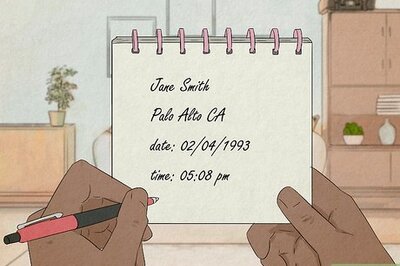








Comments
0 comment